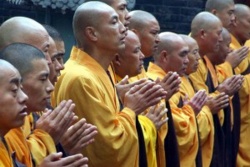Difference between revisions of "Precepts"
Jump to navigation
Jump to search
m (Text replace - "to understand" to "to understand") |
|||
| Line 12: | Line 12: | ||
Eighteen [[beliefs]] about the past | Eighteen [[beliefs]] about the past | ||
| − | In the second part, [[Buddha]] explains about the major [[beliefs]] of the [[ascetics]] in [[India]]. He began by saying, "''[[Monks]], there are other things which is very deep (profound), very hard | + | In the second part, [[Buddha]] explains about the major [[beliefs]] of the [[ascetics]] in [[India]]. He began by saying, "''[[Monks]], there are other things which is very deep (profound), very hard to understand, very difficult to perceive, so holy and [[sacred]], unreached by means of [[mind]], so subtle, that only understood and [[experienced]] by the [[wise]]. These things had been [[perceived]] clearly, seen clearly and had been left by [[Tathagata]], and by this act based on the [[truth]] that [[people]] praise and reverred [[Tathagatha]]. What are those things?''" |
{{R}} | {{R}} | ||
[http://www.mauspfeil.net/Brahmajala_Sutta.html www.mauspfeil.net] | [http://www.mauspfeil.net/Brahmajala_Sutta.html www.mauspfeil.net] | ||
[[Category:Buddhist Terms]] | [[Category:Buddhist Terms]] | ||
[[Category:Brahmajala Sutta]] | [[Category:Brahmajala Sutta]] | ||
Revision as of 17:13, 8 September 2013
In the First Part, Buddha elaborates precepts which made people praise him or the Sangha as worthy of reverrence. The list of Buddha's Higher Precepts are categorized like this:
Cula Sila
- 1. Abstain from taking another creature's life, weapon, violence. *2. Abstain from taking things which were not given. *3. Live soberly, holy, and honest. *4. Abstain from sexual relationship. *5. Not lying. *6. Speak only the truth, believeable and reliable, and never contradicting his own words *7. Abstain from slandering, *8. promote, speak, and love union (harmony) and not division (conflicts) *9. not speaking rough, insulting words. *10. speaking polite, likeable, exact, the right words and able to make people's heart joyful. *10.not wasting idle time, gossipping, *11.discussing about the Dhamma and Vinaya on the right time *12.discussing in clear, detailed, and understandable words
- 13.abstain from hurting the seeds, plants, roots, branches, cheating, trading, slavery, forgery, bribery, and criminal conducts *14.abstain from hoarding foods, drinks, clothes (robes), beddings, perfumes, spices, and other tools *15.taking meal once a day, *16.abstain from watching shows (dances, exhibitions, matches, music performances, parade, etc) *17.abstain from playing games (card games, board games, dices, game of chance, racing game, acrobatics, word games, etc) *18.abstain from using luxurious furniture and beddings *19.abstain from using cosmetics, make-up, fancy and luxurious clothes (robes), *20.abstain from discussion about people, politicians, criminals, terrors, food and beverages, clothings, places, families, cities, wars and battles, heroes, ghosts, street rumors, speculation on how the world is created, or about existence and non-existence *21.abstain from accusing or denying or goading or challenging (i.e: 'I practised this Dhamma devoutly but you don't!' or 'What you utter is old rubbish' or 'You are wrong!' or 'Free yourself if you can!) *22.abstain from being courier or messengers of politicians or higher administrations *23.abstain from deceiving lay people by uttering spells to exorcise demon or make someone's fortunate, acting like a holy person by reciting mantras
- 24.abstain from earning money from fortune-telling, divination, clairvoyance, exorcism, conjuring, magic tricks, spell, making medicine and herbs, healing people, leading/conducting ceremonies in order to gain something (wealth, fertility, etc)
Eighteen beliefs about the past In the second part, Buddha explains about the major beliefs of the ascetics in India. He began by saying, "Monks, there are other things which is very deep (profound), very hard to understand, very difficult to perceive, so holy and sacred, unreached by means of mind, so subtle, that only understood and experienced by the wise. These things had been perceived clearly, seen clearly and had been left by Tathagata, and by this act based on the truth that people praise and reverred Tathagatha. What are those things?"

